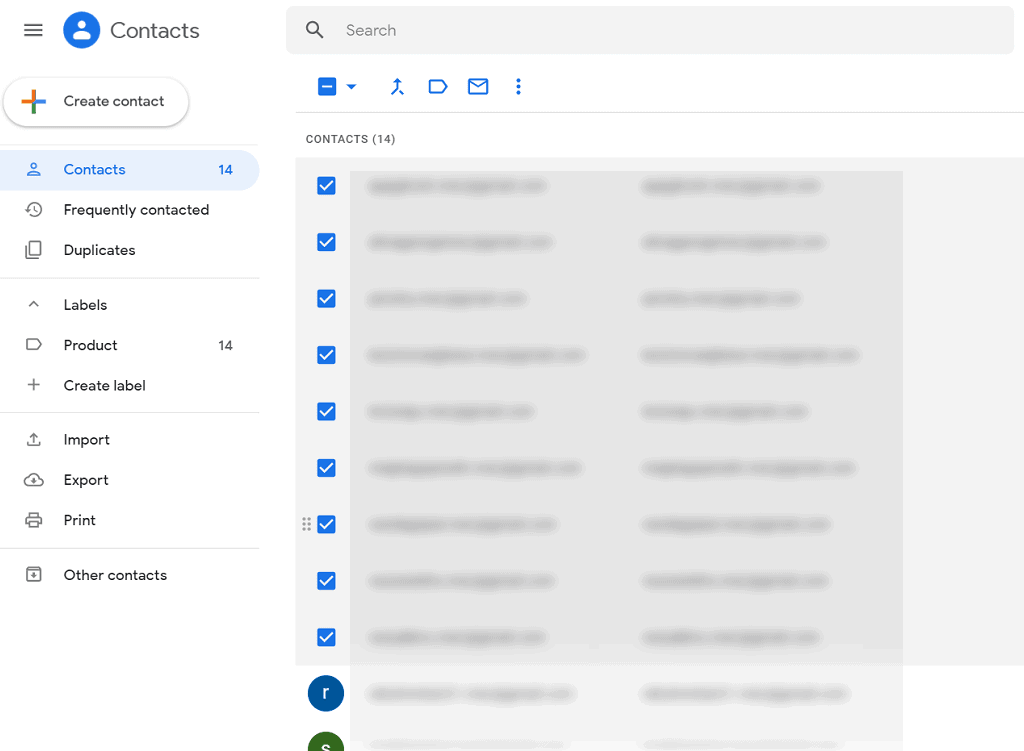Great Suggestions For Picking An Email List Site
Great Suggestions For Picking An Email List Site
Blog Article
What Factors Should I Consider When Buying A Hematologist Email List?
Be aware of these important aspects when buying a hematologist's email list. You must ensure that your list is accurate, efficient. compliant legally, and relevant for your goals in marketing. These are the most crucial considerations to consider. Quality of data and accuracy
Source of information: Check that the data provider is using trustworthy sources such as professional directories, databases or verified opt-ins made by hematologists. The quality of the list is determined by the accuracy with which contacts were taken.
Verification and updates: Ask the service provider about the data verification process they use. Verify email addresses to get rid of invalid or invalid addresses. As healthcare professionals are likely to change positions or institutions, it's essential that the list be frequently updated.
Segmentation and Specialization: Be sure the list is designed for hematologists. It could also be segmented by location or the level of experience as well as hospital affiliation and subspecialties. Segmented lists allow you to more effectively target your marketing efforts.
2. Legal Regulations
Data Privacy Laws – Ensure the list complies with relevant legislation and regulations for example California Consumer Privacy Acts in the U.S.A. or General Data Protection Regulations in Europe. This means that email addresses are only collected after consent has been given.
The CAN-SPAM Act is a law in the U.S.A. make sure that your list is compliant with the with the CANSPAM Act, which governs commercial emails. Your emails could also be branded as spam if you fail to comply.
Opt in Consent: Only add those Hematologists who have expressly consented to receive emails from other third parties. Unsolicited emailing to people who have not consented could result in an ineffective engagement or legal problems.
3. Provider Reputation
Reputable Provider: Research the reputation of the provider on the list. Check reviews, testimonials and case studies to find a trustworthy firm. A reputable company with a solid reputation is more likely to deliver compliant, high-quality information.
Transparency - Choose a data provider who is transparent in terms of the source of the data and the method of collection. It is best to avoid providers that are unclear or unclear about their methods of collecting data.
Customer Support: A reputable service will offer excellent customer support. Support is crucial if you encounter issues with your setup or technical configuration or need to alter your checklist or have concerns about compliance.
4. Cost and Return On Investment (ROI).
Pricing Model: Consider the pricing method offered, whether it's pay-per-contact or flat fee or subscription-based. Price should be aligned to the ROI potential while also balancing the quality and quantity of your options with your marketing budget.
Refund or Replacement Policy. A reliable provider has an option for refunds or replacement for obsolete or invalid emails. Clarify the terms of this policy prior to making a purchase.
Value for Money – Compare the features and prices of each list. The list with the lowest cost may not be the most beneficial when its data quality is short.
5. Ownership of data and use
The distinction between a single-use and a multiple-use email list. Multiple Use: Be sure to read the terms and conditions prior to making use of an email list. Some email service providers only let you use their lists for one campaign. Other providers may grant you complete ownership and unlimited use rights.
Exclusive vs. Shared Lists: Decide if your email list is exclusive or shared. Exclusive lists typically offer more engagement since the list members are less likely to have received emails from marketing from different sources.
6. Data Integration and Format
Integration with CRM and Email tools: Check if the list can easily be incorporated into your CRM platforms or email marketing platforms. The list should come in standard formats, such as CSV or Excel for easy integration.
User-Friendliness: Consider the ease with which it is to filter and manage your list. Lists that are hard to manage or segment may reduce the efficiency of your advertising campaigns.
7. Ethical Considerations
Relevance to Hematologists Make sure that your outreach emails are appropriate to the field of hematology. Sending content to hematologists which is not in line with their expertise could cause lower engagement, which will negatively affect your reputation as a brand.
If you send too many emails, it could be considered spam. Spam complaints can damage your reputation if it is sent too many emails.
Buying a hematologist email list could be an effective instrument for targeted marketing but it needs careful evaluation. Focus on data quality as well as the compliance with privacy laws, and the reputation of the company to ensure you get an accurate, valuable and efficient list. Prioritizing legal compliance, ethical marketing and segmentation will help you maximise your profits while also maintaining your brand's reputation. Take a look at the best hematologists email list for more recommendations.
What Do I Need To Consider When Buying A Urgent Care Email List?
When you purchase an urgent care email list it is crucial to analyze a variety of factors to ensure that the list is correct, efficient, legally compliant, and pertinent to your business goals. Here are some key considerations. Quality of data and accuracy
Source of Data: Make sure the data is collected from reliable sources for example, medical associations, healthcare databases or professional directories. Avoid lists generated by scraping data or unreliable means as they could contain incorrect and outdated information.
Verification Process - Confirm that email lists are updated regularly and checked. A reputable provider will use a strict validation process that removes invalid or outdated email addresses. This improves deliverability and reduces bounce rates.
Segmentation of Lists: The list could be segmented by the following elements the location (city/state/region), size (e.g. urgent care centers are comparatively small), specialties provided (e.g. diagnostics and pediatrics), as well as the roles taken on by decision-makers. The lists that are targeted will increase your outreach and increase engagement.
2. Legal Regulations
Data Privacy Laws - Ensure the list complies to relevant data privacy laws like the General Data Protection Regulation in Europe and the California Consumer Privacy Act in the U.S.A. This means that emails should be processed and collected legally with the consent of all parties involved.
CAN SPAM Act: In the U.S.A., all email marketing campaigns are subject to the CAN SPAM Act. This includes providing a clear opt-out mechanism, avoiding false subject lines, and include your physical address in email messages. Non-compliance will result in penalties or damage to your brand image.
Opt-In Consent - Make sure that the recipients of the email addresses on your list have expressly agreed to receive marketing messages from third parties. This can reduce the potential of spam complaints and any legal issues.
3. Provider Reputation
Established Providers: Pick one that has established track records of producing high-quality, compliant lists. Look through testimonials, case studies, and reviews from previous clients to determine the company's client satisfaction.
Transparency - The provider must be open about the data source and the date when it was last changed. If the provider of data is not able to give precise answers, it may indicate poor-quality data.
Customer support: It is essential to have a solid customer service department if you are looking for assistance with technical issues or list customization. A responsive provider is able to provide you with the most value from your list.
4. Return on investment (ROI) and cost
Email list providers usually offer different pricing models that include flat-fees, pay-per-contact or flat-fee. The pricing model must be assessed in relation to the budget for marketing and the ROI that you anticipate. You should balance the price of the item against the quality and relevancy of data.
Refund or Replacement policy: Reputable suppliers often offer an exchange or refund policy when a significant portion of email addresses is not valid or undeliverable. Be sure to know the terms of this policy prior to purchasing.
Value for money - Rather than go with the most affordable option take a look at lists that contain precise information or an elaborate segmentation. Investing in a high-quality list boosts engagement and will yield a higher return from your investment.
5. Data Ownership and Use
Multiple-Use or Single-Use? Find out if you can use this list only once in a campaign, or multiple times. Lists that are multi-useable are more valuable, especially if they will be used for continuous outreach efforts.
Exclusive vs. Shared Lists: Determine if the list is only for your business or shared with other buyers. Lists shared with others can cause list fatigue since recipients could receive numerous advertising messages. Engagement rates will decrease.
6. Integration and Data Format
CRM Compatibility: Make sure that your email list is delivered to you in a compatible format, such as CSV (Comma Separated Values) or Excel. This will ensure a smooth integration and enable you to begin your campaign quickly.
Usability Ease of Use: Your email list should permit you to filter the emails based on your own requirements. A well-organized list can increase the effectiveness of targeting and personalization.
7. Ethical Aspects
Relevance of Content Health professionals working in urgent care are often busy, so your outreach should be relevant and beneficial. Customize your messages to meet the specific needs of their clients like the medical equipment, medical supplies or medical technology they require. Sending irrelevant content could harm your reputation and diminish engagement.
Avoid Spam by being aware of the frequency at which you email. Spam complaints can be brought on by sending too many emails, or messages that are not required.
Conclusion
When you purchase an urgent email list, pay close attention to the quality of the data as well as the legal compliance and reputation of the vendor. Be sure that the list is regularly updated, and compliant with data privacy regulations. The sending of relevant content to a targeted and well-organized list will boost the number of people who are engaged and will help you get an increase in return on investment. View the pro urgent care email list for blog examples.